|
|
|
|
|
|||||||||
|
||||||||||||
|
|
||||||||||||
|
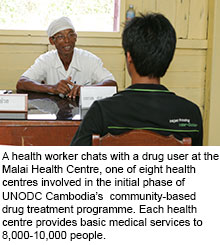
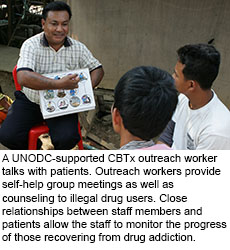
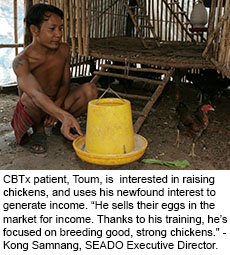
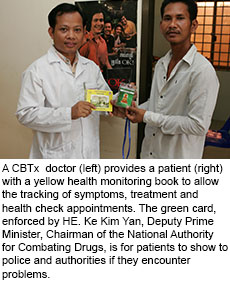 |
||||||||||||
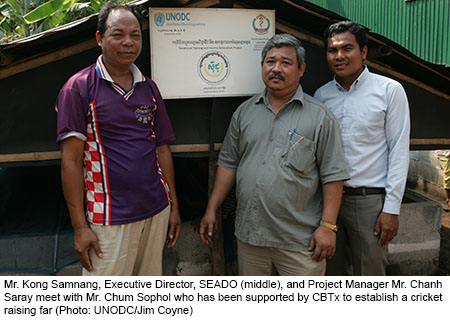
Banteay Meanchey, 19 June 2012 - Since its launch in 2010, the pilot phase of Cambodia's UNODC-supported Community-Based Drug Treatment (CBTx) programme in north-western Banteay Meanchey Province has shown positive results. On this basis it is now being expanded to Battambang and Stung Treng provinces.
In Battambang Province, the CBTx programme will extend its services to one referral hospital in Battambang town and four health centres in the surrounding communities most affected by illicit drug use. The programme will also provide health and social services to people who use drugs in Stung Treng town, which is located on an illicit drug trafficking route and has seen an increase in drug use.
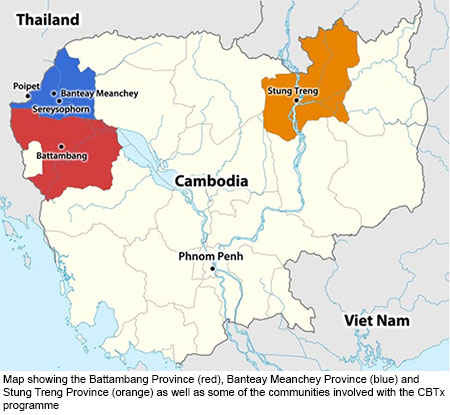
The CBTx programme provides drug users with voluntary, cost-effective and rights-based drug treatment and care services in their home communities. In addition to the current stage of expansion, there are plans for the programme to add a third referral hospital and double the number of participating health centres (to 16).
The communities participating in the pilot programme were selected because of a high number of people who use drugs. In Banteay Meanchey Province, the majority of people who use drugs smoke crystal methamphetamine or a cheap combination drug commonly known as "yama" or "yaba" containing amphetamine.
The programme is seen as a clear alternative to the Compulsory Centres for Drug Users currently conducted in the region and receives strong support from
UNODC's Global TREATNET programme, UN partner WHO, and the national and provincial governments. Key local partners include the National Authority for Combating Drugs (NACD), the Ministry of Health, Provincial Drug Control Committees, Provincial Health Departments, non-government organizations (NGOs), families, community leaders and the police and social affairs.
A wide network of support developed by the programme allows drug users to continuously access a range of services in CBTx-linked government health centres, referral hospitals and NGOs. These include individually tailored plans for counselling, health care (evaluation for degree of dependence, medical treatment and referrals), self-help guidance, HIV/AIDS prevention and testing, education, vocational training and income generating activities. Local organizations also help to conduct prevention and outreach education and social services. Each patient receives their own health booklet with a schedule of follow-up appointments.
Cambodia's Deputy Prime Minister, HE General Ke Kim Yan, is a strong advocate for the programme.
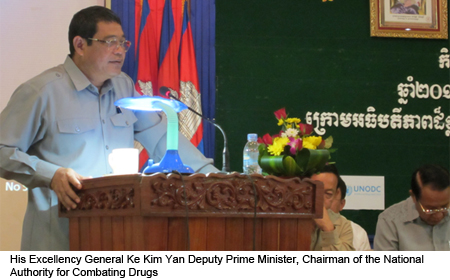
"Community-based drug treatment is an alternative for drug users which has been found effective in Banteay Meanchey, so we need to expand such services," he said recently. General Ke Kim Yan, also serves as Chairman of the National Authority for Combating Drugs.
As part of the CBTx initiative, UNODC's Treatnet programme provides financial and technocal, coordination support and trains staff at referral hospitals and health centres. Since hospital resources and capacity remain a challenge, the project's next phase will emphasize training more staff and strengthening participating services' capacity.
There is a real need for this support. Time and resources are scarce on the ground. "Often we cannot even treat patients properly due to lack of time", says a health centre worker at the Thai border-town of Poipet. "It takes one-and-a-half hours to treat each patient properly. But we often get 4-6 patients at a time, so there's little time for each one."
Acting on the frontline of the CBTx initiative is UNODC partner, SEADO
(Social Environment Agricultural Development Organisation), whose services include outreach to identify drug users, peer counselling and education and community awareness-raising. Using local community links, SEADO staff refer drug users to government health services. They follow up on users' appointments and treatment plans and educate patients on health issues related to drug use.
"Many of our community and peer educators are themselves former drug users. So they know exactly how difficult it can be to stop using drugs," says Mr. Kong Samnang, SEADO Executive Director. "They speak from experience and can quickly build trust in their community."
UNODC-supported income-generating activities are also an integral part of SEADO activities (see sidebar photo gallery for details). SEADO provides soft loans and training to drug users for income-generating activities such as cricket (for eating) farms, chicken farming, pig raising, motorbike and mobile phone repair, and barber shops. This helps drug users provide an income for themselves which is a major factor in re-gaining self respect - and the respect of their communities. It is an essential element in social reintegration.
Background:
The CBTx initiative receives technical support from the Global Treatnet programme and the Global Joint UNODC-WHO Programme on Drug Dependence Treatment. Funds are provided by Sweden and the United States. The Cambodia CBTx programme is expected to expand nationwide to 350 communities by 2016.
Within the United Nations, UNODC is the lead agency for combating drug and crime-related issues. To deliver the pilot programme, UNODC Cambodia has partnered with other UN agencies including WHO, UNAIDS and UNICEF, as well as Cambodian government authorities including the National Authority for Combating Drugs (NACD), the Ministry of Health (MoH) and the Ministry of Social Affairs, Veterans and Youth Rehabilitation (MoSAVY).
|
|
|
|